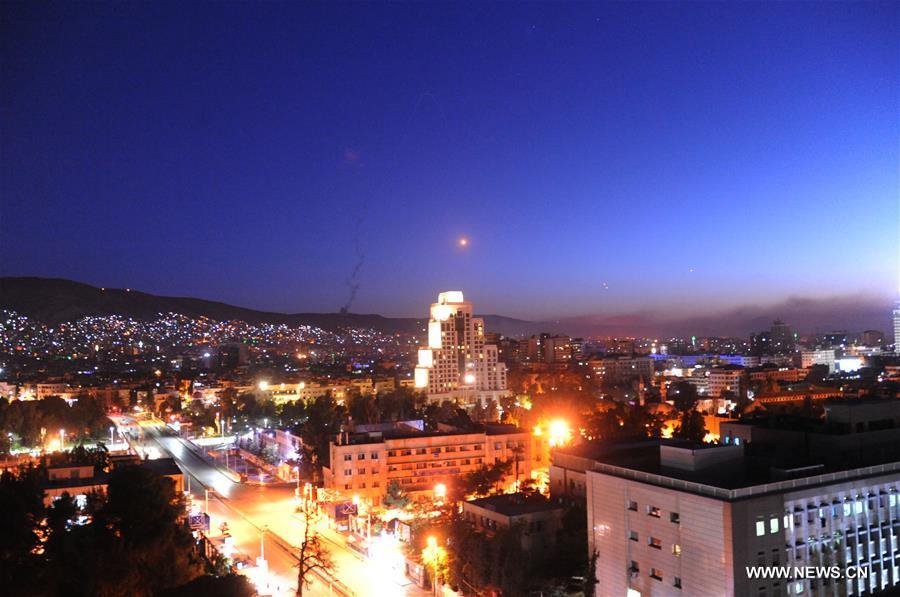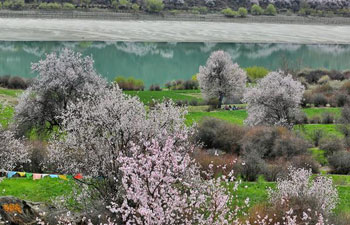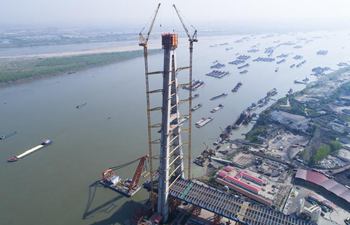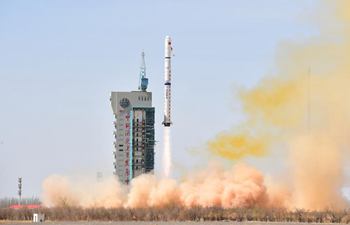
Surface-to-air missiles are seen over Syria's capital Damascus on April 14, 2018, as the Syrian air defenses were responding to U.S. attacks. The U.S. started military actions against Damascus before daybreak Saturday as loud explosions were heard with "red dots" seen flying from earth to the sky, reported Syrian state TV and Xinhua reporters in Damascus. (Xinhua/Ammar Safarjalani)
WASHINGTON, April 13 (Xinhua) -- Though U.S. President Donald Trump said Friday he had ordered precise strikes on Syrian military facilities in a coordinated action with Britain and France, the legitimacy of the action is questionable.
The U.S. and British governments have said the military actions would deter future use of chemical weapons, referring to an alleged chemical attack in Douma, a Syrian suburb northeast of capital Damascus, on April 7.
While the U.S. and its allies allege Syrian President Bashar al-Assad's military was behind the attack, there is no evidence so far to support the suspicion. The Organization for the Prohibition of Chemical Weapons, which will be investigating the incident, is expected to begin only on Saturday.
SUDDEN ANNOUNCEMENT
In a televised speech late Friday, Trump said he ordered the U.S. armed forces to attack targets related with Syria's chemical weapons capabilities.
"The purpose of our actions tonight is to establish a strong deterrent against the production, spread and use of chemical weapons," he said. "Establishing this deterrent is a vital national security interest of the United States."
Chairman of the Joint Chiefs of Staff Joseph Dunford said in a press briefing at the Pentagon that the targets were specifically associated with Syria's chemical weapons program.
The first target was a military facility for research and development of chemical and biological warfare technology; the second was assessed as the primary location of Syria's sarin gas equipment; and the third, in the vicinity of the second target, contained a chemical weapons equipment storage facility and an important command post, Dunford said.
U.S. Defense chief James Mattis also said in the briefing that "right now, this is a one-time shot." However, he did not rule out further attacks.
SYRIA COUNTERS, RUSSIA WARNS
The Syrian state TV said the Syrian military used its anti-aircraft weapons to combat the airstrike and destroyed 13 missiles.
The Syrian Foreign Ministry condemned the strike Saturday, saying it violated the international law and the UN Charter, the state-run news agency reported.
Russian Ambassador to the United States Anatoly Antonov said the attacks against Syria "will not be left without consequences."
"The worst apprehensions have come true," Antonov said in a statement. "Our warnings have been left unheard."
The United States violated all international norms, Alexander Sherin, first deputy chairman of Russia's State Duma Defense Committee, said. Russia views the strike as an act of aggression, Sherin said.
Russian Foreign Ministry spokesperson Maria Zakharova commented on Facebook that the United States and its allies struck Syria at a time when the country had a chance for a peaceful future.
Earlier on Friday, China's Permanent Representative to the United Nations Ma Zhaoxu had called on the parties concerned to remain calm and exercise restraint.
QUESTIONABLE POLICY
Middle East experts say the attack reveals Trump's lack of policies on the Middle East.
"While retaliation may briefly relieve Western guilt over the Syrian tragedy and boost Mr. Trump's self-image, it cannot be a substitute for a policy," Roula Khalaf, deputy editor of Financial Times and an expert on Middle East issues, wrote in her commentary "Syria response: bombing is no substitute for policy" Thursday.
"Assad was never realistically going to negotiate his own demise. Not while his allies the Russians and the Iranians backed him on the ground and in the Security Council. So he's here to stay," Rania Abouzeid, author of "No Turning Back: Life, Loss and Hope in Wartime Syria", a chronicle of the Syrian war, told CNN.
"Right now, the concerns that have long shaped American interests in the Middle East will continue to do so, but no one seems willing to defend them -- least of all the president of the United States, who has made the Middle East an extension of the domestic political calculations," Steven Cook, a senior fellow for Middle East and Africa studies at the Council on Foreign Relations, said.
"No wonder no one there cares much anymore about what Washington says or does," he added.
Related:
Syria says over 100 missiles fired in U.S.-led strike
UN chief alarmed by U.S.-led airstrikes against Syria
Syrian Foreign Ministry condemns U.S.-led attack
Syrians defiant after U.S.-led air strikes
Moscow says allied attack missiles not routed through Russian defense zone in Syria















